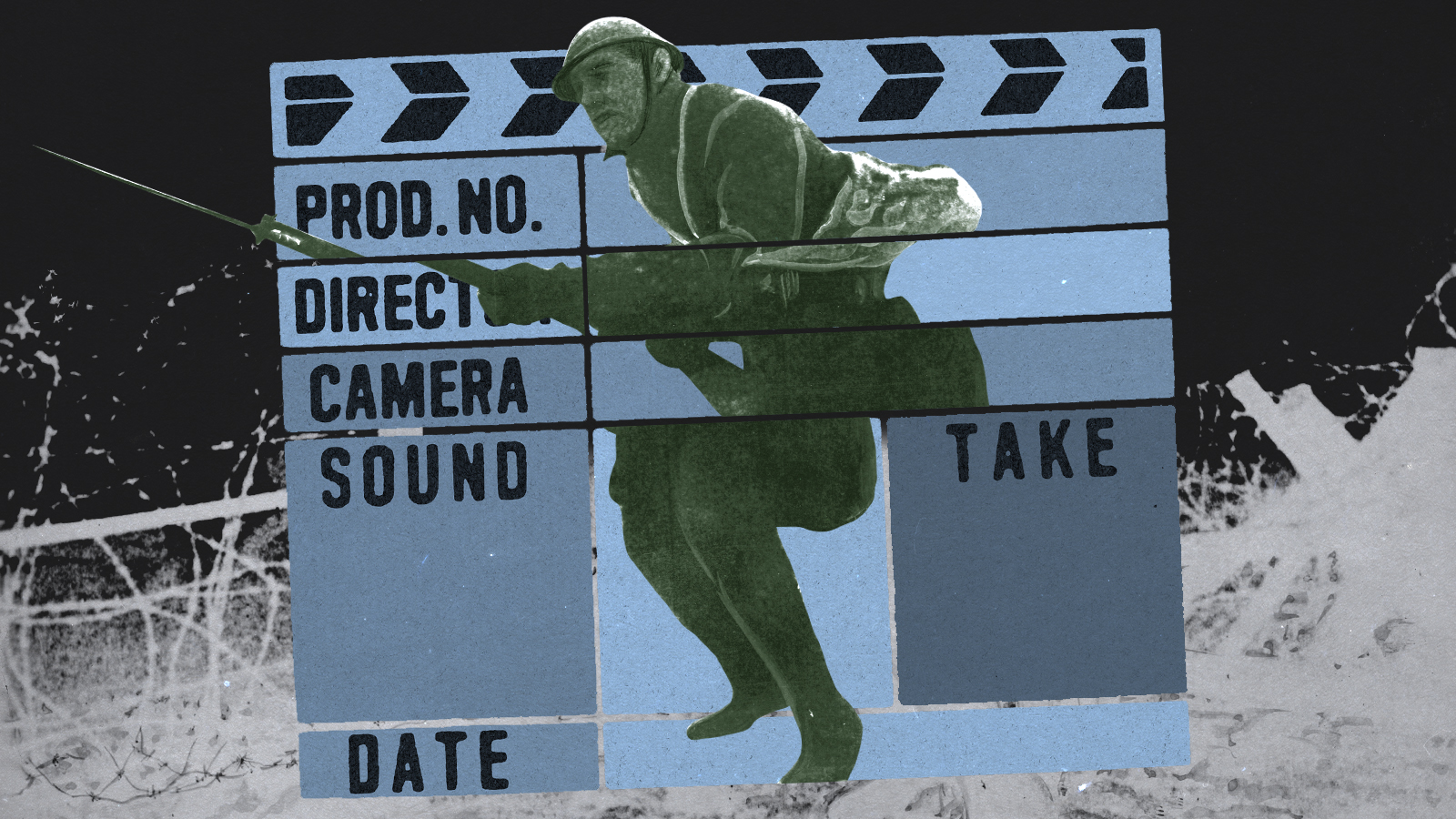The best World War I movies
Five films to watch for the anniversary of the signing of the Treaty of Versailles


A free daily email with the biggest news stories of the day – and the best features from TheWeek.com
You are now subscribed
Your newsletter sign-up was successful
One hundred and three years ago today, the combatants of the First World War signed a peace agreement in Versailles, France, formally ending a five-year-long globe-spanning conflict that killed 10 million people.
World War I has received the Hollywood treatment much less often than the Second World War, perhaps because it is more distant in the past and harder to romanticize and partly because the U.S. didn't join the conflict until it had been going on for three years. The Great War, as it was known until WWII, is best remembered for its pointless, gruesome trench warfare stalemates that left a generation of men dead or traumatized. In one four-month period, known as The Battle of the Somme, more than 1 million British, German and French soldiers were killed or wounded — all so that Allied forces could advance just seven miles.
Perhaps not coincidentally, most WWI films are staunchly anti-war, and several of them are among the most harrowing films you will ever watch. Here are five of the greatest films about the war:
The Week
Escape your echo chamber. Get the facts behind the news, plus analysis from multiple perspectives.

Sign up for The Week's Free Newsletters
From our morning news briefing to a weekly Good News Newsletter, get the best of The Week delivered directly to your inbox.
From our morning news briefing to a weekly Good News Newsletter, get the best of The Week delivered directly to your inbox.
Paths of Glory (Stanley Kubrick, 1957)
In this wrenching anti-war film, Kirk Douglas plays Colonel Jax, a French officer who leads a charge out of the trenches to take a German position called The Anthill. The fruitless attack unfolds disastrously, and the next wave of soldiers refuses to leave the trench. General Paul Mireau (George Macready) orders artillery to fire on the troops massed in the trenches, which is refused. Livid, Mireau orders the court-martial of three men, one from each company that refused to go over. Dax, an attorney in civilian life, agrees to defend them. Paths of Glory was one of Stanley Kubrick's first major feature films, and his meticulous craftwork is evident throughout. Toward the end of the film, Dax lashes out at General George Broulard, who ordered the attack. Broulard asks him, "Wherein have I done wrong?" Dax replies, "Because you don't know the answer to that question, I pity you." There was only so much carnage you could show then, but battle scenes are no less terrifying for the absence of gore.
1917 (Sam Mendes, 2019)
Sam Mendes' WWI movie was dismissed by some as a gimmick — the whole movie is two long, unbroken takes — but if so, it's a quite successful one. It follows British soldiers Will Schofield (George MacKay) and Tom Blake (Dean-Charles Chapman), who are tasked with moving stealthily through enemy territory to deliver a message that a German ambush is awaiting a British offensive whose leaders mistakenly believe the Germans have retreated. One of the men to be saved is Blake's brother, Joseph. That gives the film a superficial resemblance to the quest at the heart of Saving Private Ryan. Unlike most other prominent WWI films, though, Mendes stops short of a full indictment of the war's futility. Indeed, 1917 demonstrates how Kubrick's open contempt for high-ranking military officials and for war itself has dissolved into our era's military hero-worship, such that even a technical masterpiece about an utterly futile mission cannot really come out and say that it was all a waste.
Gallipoli (Peter Weir, 1981)
If you can stop yourself from thinking about what Mel Gibson ultimately turned into, this Australian film is both engrossing and moving. It tells the story of Archy Hamilton (Mark Lee) and Frank Dunne (Gibson) who join the Australian force that is sent to the Middle East to take part in the Gallipoli Campaign, designed to cut the Ottoman capital of Istanbul off from its supply lines and deliver a knock-out blow to the Turks, who were one of the Central Powers along with Germany and Austria. The film features a long wind-up to the main action, including a lengthy detour in Cairo, but the emotional wallop comes late, as Archy and Frank's unit takes part in a suicidal and pointless charge directly into Ottoman machine gunners. While it didn't save their empire, the Ottomans held their ground in the battle, which killed more than 100,000 soldiers, including almost 8,000 from Australia. Director Peter Weir (Dead Poet's Society) skillfully uses an almost carefree set-up to deliver an absolutely gut-wrenching finale that will stick with you for days.
The Trench (William Boyd, 1999)
Chock full of future stars — including to-be James Bond Daniel Craig; Cillian Murphy (28 Days Later); and James D'Arcy (Broadchurch) — the vast majority of the action in this little-known film takes place in the two days prior to the Battle of the Somme, referred to in the movie as "The Big Push." Craig plays a sergeant in command of the skeleton force guarding a forward trench right before the attack. The most shocking moment is when a well-bred British commander is marched in to be filmed giving a rousing speech to the troops about how they'll be able to approach the German trenches "on walking sticks" smoking their pipes because the artillery barrage has wiped out the enemy defenses. As the hour of the attack approaches, the truth of the impending slaughter dawns on them all. Director William Boyd's film takes an unusual amount of care in establishing the characters as distinct, recognizable human beings, making their fate all the more poignant when the carnage finally commences in earnest.
A free daily email with the biggest news stories of the day – and the best features from TheWeek.com
A Very Long Engagement (Jean-Pierre Jeunet, 2004)
Produced at the height of French actress Audrey Tautou's stateside fame, Jean-Pierre Jeunet's film was presented to American audiences in trailers as more Amelie-like whimsy, only this time with war. But despite Jeunet's unmistakable aesthetic, A Very Long Engagement is actually quite a bleak film, which follows Tautou's Mathilde searching for her fiance, Manech (Gaspard Ulliel), who disappeared during The Battle of the Somme after being convicted along with four other officers of self-mutilation to escape the war. Interestingly, it ultimately explores similar themes to Paths of Glory, indicting the military bureaucracy and its metronomic operations, including the heartless punishment of those whose spirits are broken by the war. Mathilde's search takes her on a series of adventures, and a good deal of the film is set after the war, but the denouement is as chilling as any movie set exclusively in a trench.
David Faris is a professor of political science at Roosevelt University and the author of "It's Time to Fight Dirty: How Democrats Can Build a Lasting Majority in American Politics." He's a frequent contributor to Newsweek and Slate, and his work has appeared in The Washington Post, The New Republic and The Nation, among others.
-
 How the FCC’s ‘equal time’ rule works
How the FCC’s ‘equal time’ rule worksIn the Spotlight The law is at the heart of the Colbert-CBS conflict
-
 What is the endgame in the DHS shutdown?
What is the endgame in the DHS shutdown?Today’s Big Question Democrats want to rein in ICE’s immigration crackdown
-
 ‘Poor time management isn’t just an inconvenience’
‘Poor time management isn’t just an inconvenience’Instant Opinion Opinion, comment and editorials of the day
-
 Microdramas are booming
Microdramas are boomingUnder the radar Scroll to watch a whole movie
-
 Film reviews: ‘Wuthering Heights,’ ‘Good Luck, Have Fun, Don’t Die,’ and ‘Sirat’
Film reviews: ‘Wuthering Heights,’ ‘Good Luck, Have Fun, Don’t Die,’ and ‘Sirat’Feature An inconvenient love torments a would-be couple, a gonzo time traveler seeks to save humanity from AI, and a father’s desperate search goes deeply sideways
-
 The biggest box office flops of the 21st century
The biggest box office flops of the 21st centuryin depth Unnecessary remakes and turgid, expensive CGI-fests highlight this list of these most notorious box-office losers
-
 The 8 best superhero movies of all time
The 8 best superhero movies of all timethe week recommends A genre that now dominates studio filmmaking once struggled to get anyone to take it seriously
-
 Heated Rivalry, Bridgerton and why sex still sells on TV
Heated Rivalry, Bridgerton and why sex still sells on TVTalking Point Gen Z – often stereotyped as prudish and puritanical – are attracted to authenticity
-
 Film reviews: ‘Send Help’ and ‘Private Life’
Film reviews: ‘Send Help’ and ‘Private Life’Feature An office doormat is stranded alone with her awful boss and a frazzled therapist turns amateur murder investigator
-
 February’s new movies include rehab facilities, 1990s Iraq and maybe an apocalypse
February’s new movies include rehab facilities, 1990s Iraq and maybe an apocalypsethe week recommends Time travelers, multiverse hoppers and an Iraqi parable highlight this month’s offerings during the depths of winter
-
 The 8 best animated family movies of all time
The 8 best animated family movies of all timethe week recomends The best kids’ movies can make anything from the apocalypse to alien invasions seem like good, wholesome fun
